- Home
- Alice Munro
The Love of a Good Woman Page 11
The Love of a Good Woman Read online
Page 11
Kath danced with a man she did not remember seeing before during the whole evening. He seemed to be around Cottar’s age. He was tall, with a thickened, softened waistline, a mat of dull curly hair, and a spoiled, bruised look around the eyes.
“I may fall off,” Kath said. “I’m dizzy. I may fall overboard.”
He said, “I’ll catch you.”
“I’m dizzy but I’m not drunk,” she said.
He smiled, and she thought, That’s what drunk people always say.
“Really,” she said, and it was true because she had not finished even one bottle of beer, or touched the punch.
“Unless I got it through my skin,” she said. “Osmosis.”
He didn’t answer, but pulled her close then released her, holding her eyes.
The sex Kath had with Kent was eager and strenuous, but at the same time reticent. They had not seduced each other but more or less stumbled into intimacy, or what they believed to be intimacy, and stayed there. If there is only to be the one partner in your life nothing has to be made special—it already is so. They had looked at each other naked, but at those times they had not except by chance looked into each other’s eyes.
That was what Kath was doing now, all the time, with her unknown partner. They advanced and retreated and circled and dodged, putting on a show for each other, and looking into each other’s eyes. Their eyes declared that this show was nothing, nothing compared to the raw tussle they could manage when they chose.
Yet it was all a joke. As soon as they touched they let go again. Close up, they opened their mouths and teased their tongues across their lips and at once drew back, pretending languor.
Kath was wearing a short-sleeved brushed-wool sweater, convenient for nursing because it had a low V neck and was buttoned down the front.
The next time they came close her partner raised his arm as if to protect himself and moved the back of his hand, his bare wrist and forearm across her stiff breasts under their electric wool. That made them stagger, they almost broke their dance. But continued—Kath weak and faltering.
She heard her name being called.
Mrs. Mayberry. Mrs. Mayberry.
It was the baby-sitter, calling from halfway down Monica’s steps.
“Your baby. Your baby’s awake. Can you come and feed her?”
Kath stopped. She worked her way shakily through the other dancers. Out of the light, she jumped down, and stumbled in the sand. She knew her partner was behind her, she heard him jump behind her. She was ready to offer her mouth or her throat to him. But he caught her hips, turned her around, dropped to his knees, and kissed her crotch through her cotton pants. Then he rose up lightly for such a large man, they turned away from each other at the same moment. Kath hurried into the light and climbed the steps to Monica’s house. Panting, and pulling herself up by the railing, like an old woman.
The baby-sitter was in the kitchen.
“Oh, your husband,” she said. “Your husband just came in with the bottle. I didn’t know what the arrangement was or I could have saved myself yelling.”
Kath went on into Monica’s living room. The only light there came from the hall and the kitchen, but she could see that it was a real living room, not a modified porch like hers and Sonje’s. There was a Danish modern coffee table and upholstered furniture and draw drapes.
Kent was sitting in an armchair, feeding Noelle from her supplemental bottle.
“Hi,” he said, speaking quietly though Noelle was sucking too vigorously to be even half asleep.
“Hi,” said Kath, and sat down on the sofa.
“I just thought this would be a good idea,” he said. “In case you’d been drinking.”
Kath said, “I haven’t. Been drinking.” She raised a hand to her breasts to test their fullness, but the stir of the wool gave her such a shock of desire that she couldn’t press further.
“Well now you can, if you want to,” Kent said.
She sat just on the edge of the sofa, leaning forward, longing to ask him, did he come here by the front or the back way? That is, along the road or along the beach? If he had come along the beach he was almost bound to have seen the dancing. But there were quite a lot of people dancing on the dock now, so perhaps he would not have noticed individual dancers.
Nevertheless, the baby-sitter had spotted her. And he would have heard the baby-sitter calling her, calling her name. Then he would have looked to see where the baby-sitter was directing her call.
That is, if he came by the beach. If he came by the road and entered the house by the hall not the kitchen he wouldn’t have seen the dancers at all.
“Did you hear her calling me?” Kath said. “Is that why you went home and got the bottle?”
“I’d already thought about it,” he said. “I thought it was time.” He held up the bottle to see how much Noelle had taken.
“Hungry,” he said.
She said, “Yes.”
“So now’s your opportunity. If you want to get sloshed.”
“Is that what you are? Sloshed?”
“I’ve taken on my fair share,” he said. “Go on if you want to. Have yourself a time.”
She thought his cockiness sounded sad and faked. He must have seen her dancing. Or else he would have said, “What have you done to your face?”
“I’d sooner wait for you,” she said.
He frowned at the baby, tipping up the bottle.
“Nearly finished,” he said. “Okay if you want.”
“I just have to go to the bathroom,” Kath said. And in the bathroom, as she had expected in Monica’s house, there was a good supply of Kleenex. She ran the water hot, and soaked and scrubbed, soaked and scrubbed, from time to time flushing a wad of black and purple tissues down the toilet.
IV
IN the middle of the second drink, when Kent was talking about the astounding, really obscene prices of real estate these days in West Vancouver, Sonje said, “You know, I have a theory.”
“Those places we used to live in,” he said. “They went long ago. For a song, compared to now. Now I don’t know what you’d get for them. Just for the property. Just for a teardown.”
What was her theory? About the price of real estate?
No. It was about Cottar. She did not believe that he was dead.
“Oh, I did at first,” she said. “It never occurred to me to doubt it. And then suddenly I just woke up and saw it didn’t necessarily have to be true. It didn’t have to be true at all.”
Think of the circumstances, she said. A doctor had written to her. From Jakarta. That is, the person writing to her said that he was a doctor. He said that Cottar had died and he said what he had died of, he used the medical term which she forgot now. Anyway it was an infectious disease. But how did she know that this person really was a doctor? Or even, granted that he might be a doctor, how did she know that he was telling the truth? It would not be difficult for Cottar to have made the acquaintance of a doctor. To have become friends. Cottar had all sorts of friends.
“Or even to have paid him,” she said. “That isn’t outside the range of possibility either.”
Kent said, “Why would he do that?”
“He wouldn’t be the first doctor to do something like that. Maybe he needed the money to keep a clinic going for poor people, how do we know? Maybe he just wanted it for himself. Doctors aren’t saints.”
“No,” said Kent. “I meant Cottar. Why would Cottar do it? And did he have any money?”
“No. He didn’t have any himself but—I don’t know. It’s only one hypothesis anyway. The money. And I was here, you know. I was here to take care of his mother. He really cared about his mother. He knew I’d never desert her. So that was all right.
“It really was all right,” she said. “I was very fond of Delia. I didn’t find it a burden. I might really have been better suited to taking care of her than to being married to Cottar. And you know, something strange. Delia thought the same as I did. About Cottar. S
he had the same suspicions. And she never mentioned them to me. I never mentioned mine to her. Each of us thought it would break the other’s heart. Then one evening not that long before she—had to go, I was reading her a mystery story that was set in Hong Kong, and she said, ‘Maybe that’s where Cottar is. Hong Kong.’
“She said she hoped she hadn’t upset me. Then I told her what I’d been thinking, and she laughed. We both laughed. You would expect an old mother would be grief-stricken talking about how her only child had run off and left her, but no. Maybe old people aren’t like that. Really old people. They don’t get grief-stricken anymore. They must figure it’s not worth it.
“He knew I’d take care of her, though he probably didn’t know how long that would last,” she said. “I wish I could show you the doctor’s letter, but I threw it out. That was very stupid, but I was distraught at the time. I didn’t see how I was going to get through the rest of my life. I didn’t think how I should follow up and find out what his credentials were or ask about a death certificate or anything. I thought of all that later and by then I didn’t have an address. I couldn’t write to the American embassy because they were the last people Cottar would have had anything to do with. And he wasn’t a Canadian citizen. Maybe he even had another name. False identity he could slip into. False papers. He used to hint about things like that. That was part of the glamour about him, for me.”
“Some of that could have been along the lines of self-dramatizing,” Kent said. “Don’t you think?” Sonje said, “Of course I think.”
“There wasn’t any insurance?”
“Don’t be silly.”
“If there’d been insurance, they’d have found out the truth.”
“Yes but there wasn’t,” Sonje said. “So. That’s what I intend to do.”
She said that this was one thing she had never mentioned to her mother-in-law. That after she was on her own, she was going to go looking. She was going to find Cottar, or find the truth.
“I suppose you think that’s some wild kind of fantasy?” she said.
Off her rocker, thought Kent with an unpleasant jolt. With every visit he had made on this trip, there had come a moment of severe disappointment. The moment when he realized that the person he was talking to, the person he had made a point of seeking out, was not going to give him whatever it was he had come for. The old friend he had visited in Arizona was obsessed with the dangers of life, in spite of his expensive residence in a protected community. His old friend’s wife, who was over seventy, wanted to show him pictures of herself and some other old woman dressed up as Klondike dance-hall girls, for a musical show they had put on. And his grown-up children were caught up in their own lives. That was only natural and not a surprise to him. The surprise was that these lives, the lives his sons and daughter were living, seemed closed in now, somewhat predictable. Even the changes in them that he could foresee or was told were coming—Noelle was on the verge of leaving her second husband—were not very interesting. He had not made any admission of this to Deborah—hardly even to himself—but it was so. And now Sonje. Sonje whom he hadn’t particularly liked, whom he’d been wary of in some way, but whom he’d respected, as a bit of a mystery—Sonje had turned into a talkative old woman with a secret screw loose.
And he’d had a reason for coming to see her that they were not getting any closer to, with this rant about Cottar.
“Well to be frank,” he said. “It doesn’t sound like such a sensible thing to do, to be frank about it.”
“A wild-goose chase,” said Sonje cheerfully.
“There’s a probability he might be dead now anyway.”
“True.”
“And he could have gone anywhere and lived anywhere. That is if your theory is correct.”
“True.”
“So the only hope is if he really died then and your theory isn’t correct, then you might find out about it and you wouldn’t be any further ahead than you are now anyway.”
“Oh, I think I would.”
“You could do just as well then to stay here and write some letters.”
Sonje said she disagreed. She said you couldn’t go through official channels regarding this sort of thing.
“You have to make yourself known in the streets.”
In the streets of Jakarta—that was where she meant to start. In places like Jakarta people don’t shut themselves up. People live in the streets and things are known about them. Shopkeepers know, there’s always somebody who knows somebody else and so forth. She would ask questions and word would get around that she was there. A man like Cottar could not have just slipped by. Even after all this time there’d be some memory. Information of one sort or another. Some of it expensive, not all of it truthful. Nevertheless.
Kent thought of asking her what she planned to use for money. Could she have inherited something from her parents? He seemed to remember that they’d cut her off at the time of her marriage. Perhaps she thought she could get a fat price for this property. A long shot, but maybe she was right.
Even so, she could fling it all away in a couple of months. Word would get around that she was there, all right.
“Those cities have changed a lot” was all he said.
“Not that I’d neglect the usual channels,” she said. “I’d go after everybody I could. The embassy, the burial records, the medical registry if there is such a thing. In fact I’ve written letters already. But all you get is the runaround. You have to confront them in the flesh. You have to be there. Be there. Keep coming around and making a nuisance of yourself and finding out where their soft spots are and be prepared to pass something under the table if you have to. I don’t have any illusions about its being easy.
“For instance I expect there’ll be devastating heat. It doesn’t sound as if it has a good location at all—Jakarta. There are swamps and lowlands all around. I’m not stupid. I’ll get my shots and take all the precautions. I’ll take my vitamins, and Jakarta being started by the Dutch there shouldn’t be any shortage of gin. The Dutch East Indies. It’s not a very old city, you know. It was built I think sometime in the 1600s. Just a minute. I have all sorts of—I’ll show you—I have—”
She set down her glass which had been empty for some time, got up quickly, and after a couple of steps caught her foot in the torn sisal and lurched forward, but steadied herself by holding on to the door frame and didn’t fall. “Got to get rid of this old matting,” she said, and hurried into the house.
He heard a struggle with stiff drawers, then a sound as of a pile of papers falling, and all through this she kept talking to him, in that half-frantic reassuring way of people desperate not to lose your attention. He could not make out what she was saying, or didn’t try to. He was taking the opportunity to swallow a pill—something he’d been thinking about doing for the last half hour. It was a small pill that didn’t require him to take a drink—his glass was empty too—and he could probably have got it to his mouth without Sonje’s noticing what he was doing. But something like shyness or superstition prevented him from trying. He did not mind Deborah’s constant awareness of his condition, and his children of course had to know, but there seemed to be some sort of ban against revealing it to his contemporaries.
The pill was just in time. A tide of faintness, unfriendly heat, threatened disintegration, came crawling upwards and broke out in sweat drops on his temples. For a few minutes he felt this presence making headway, but by a controlled calm breathing and a casual rearrangement of his limbs he held his own against it. During this time Sonje reappeared with a batch of papers—maps and printed sheets that she must have copied from library books. Some of them slipped from her hands as she sat down. They lay scattered around on the sisal.
“Now, what they call old Batavia,” she said. “That’s very geometrically laid out. Very Dutch. There’s a suburb called Weltevreden. It means ‘well contented.’ So wouldn’t it be a joke if I found him living there? There’s the Old Portuguese Church. Built in t
he late 1600s. It’s a Muslim country of course. They have the biggest mosque there in Southeast Asia. Captain Cook put in to have his ships repaired, he was very complimentary about the shipyards. But he said the ditches out in the bogs were foul. They probably still are. Cottar never looked very strong, but he took better care of himself than you’d think. He wouldn’t just go wandering round malarial bogs or buying drinks from a street vendor. Well of course now, if he’s there, I expect he’ll be completely acclimatized. I don’t know what to expect. I can see him gone completely native or I can see him nicely set up with his little brown woman waiting on him. Eating fruit beside a pool. Or he could be going around begging for the poor.”
As a matter of fact there was one thing Kent remembered. The night of the party on the beach, Cottar wearing nothing but an insufficient towel had come up to him and asked him what he knew, as a pharmacist, about tropical diseases.
But that had not seemed out of line. Anybody going where he was going might have done the same.
“You’re thinking of India,” he said to Sonje.
He was stabilized now, the pill giving him back some reliability of his inner workings, halting what had felt like the runoff of bone marrow.
“You know one reason I know he’s not dead?” said Sonje. “I don’t dream about him. I dream about dead people. I dream all the time about my mother-in-law.”
“I don’t dream,” Kent said.
“Everybody dreams,” said Sonje. “You just don’t remember.”
He shook his head.
Kath was not dead. She lived in Ontario. In the Haliburton district, not so far from Toronto.
“Does your mother know I’m here?” he’d said to Noelle. And she’d said, “Oh, I think so. Sure.”
But there came no knock on the door. When Deborah asked him if he wanted to make a detour he had said, “Let’s not go out of our way. It wouldn’t be worth it.”
Kath lived alone beside a small lake. The man she had lived with for a long time, and built the house with, was dead. But she had friends, said Noelle, she was all right.

 Runaway
Runaway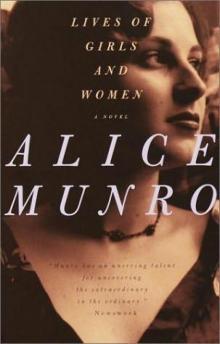 Lives of Girls and Women
Lives of Girls and Women Dance of the Happy Shades
Dance of the Happy Shades Open Secrets
Open Secrets Julieta (Movie Tie-in Edition)
Julieta (Movie Tie-in Edition)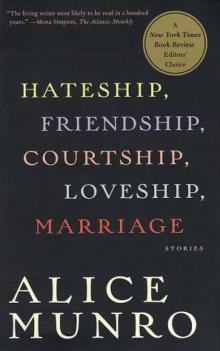 Hateship, Friendship, Courtship, Loveship, Marriage: Stories
Hateship, Friendship, Courtship, Loveship, Marriage: Stories Alice Munro's Best
Alice Munro's Best The Progress of Love
The Progress of Love Selected Stories
Selected Stories Away from Her
Away from Her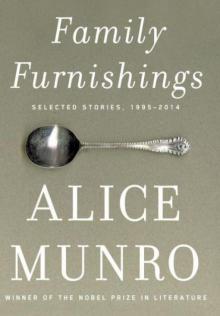 Family Furnishings
Family Furnishings Moons of Jupiter
Moons of Jupiter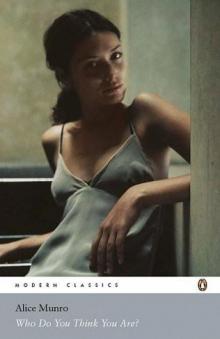 Who Do You Think You Are?
Who Do You Think You Are? Hateship, Friendship, Courtship, Loveship, Marriage
Hateship, Friendship, Courtship, Loveship, Marriage The Moons of Jupiter
The Moons of Jupiter Vintage Munro
Vintage Munro The Love of a Good Woman
The Love of a Good Woman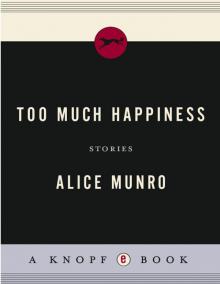 Too Much Happiness
Too Much Happiness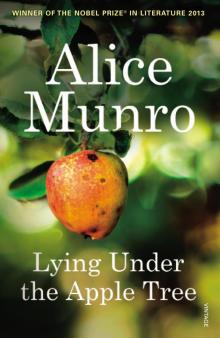 Lying Under the Apple Tree
Lying Under the Apple Tree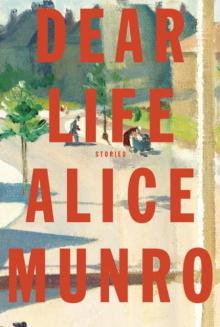 Dear Life
Dear Life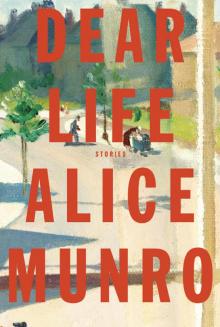 Dear Life: Stories
Dear Life: Stories Friend of My Youth
Friend of My Youth Dance of the Happy Shades: And Other Stories
Dance of the Happy Shades: And Other Stories The Beggar Maid
The Beggar Maid